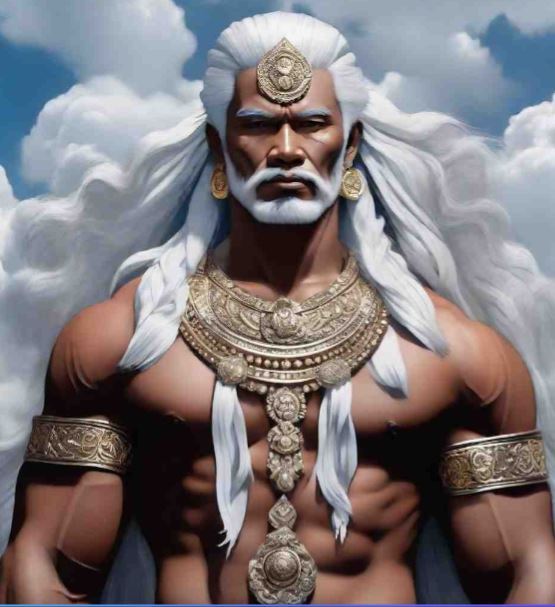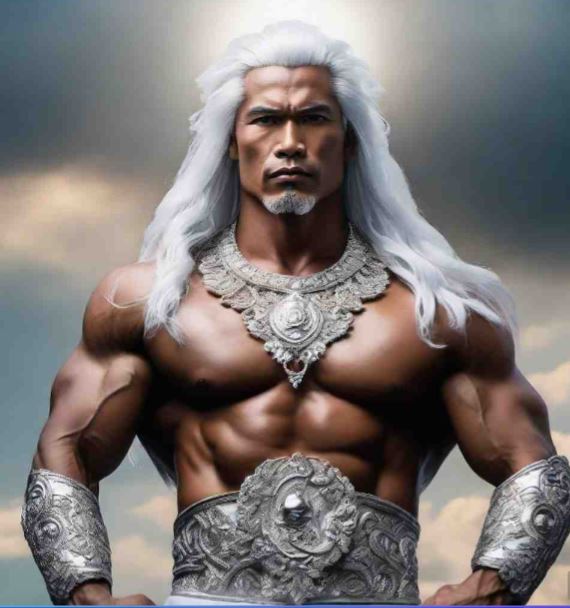 |
| Languiton Langiton Langit |
Languiton The primal Bicolano god representing the sky. Believed to reside in the upper heavens were flying beasts and winged monsters roam free. He is Sovereign of all the flying creatures in the skies. He associated with the clear blue skies that represent purity of soul, truth, and stability Langit or Languiton is the personification of the sky and one of the Bikolano primordial deities.
The primodial god of the sky
Langiton
Languiton
In Philippine mythology, the Bikolano people have woven tales of deities that personify the elements, shaping the cosmos and influencing the destiny of humanity. One such deity is Languiton, the primal god representing the sky. In this essay, we explore the Bikolano myth surrounding Languiton, his family, and the profound impact their actions had on the creation of the world and the diversity of its inhabitants. The myth of Languiton and his family offers a profound narrative of creation, betrayal, and consequence in the Bikolano tradition. It not only explains the origins of natural elements but also accounts for the diverse hues of humanity, attributing them to the whims of the gods. This tale exemplifies the cultural richness embedded in Philippine mythology, offering a glimpse into the intricate beliefs that have shaped the identity of the Bikolano people.
Mula sa kawalan
According to Bikolano mythology, in the beginning, there existed nothing but the void. Suddenly, the great sea emerged alongside the endless skies, bringing with them beasts and monsters that roamed the vast expanse of water and air. The kingdom of the sky fell under the dominion of Languiton, the god of the skies, while the god Tubigan ruled over the waters.
 |
| Languiton god of the sky |
the gods
Languiton's daughter, Dagat, the personification of the sea, married Paros, the wind, who was Tubigan's son. The union produced four children: Daga, Aldao, Bulan, and Bitoon. Each child embodied distinct elements - Daga had a body of rock, Aldao was made of gold, Bulan was crafted from copper, and Bitoon radiated pure silver beauty.
Tragedy Strikes:
After the demise of their father, Paros, Daga, the eldest son, sought to expand his power. He convinced his younger brothers, Bulan and Aldao, to join him in an attack on the kingdom of Languiton. Despite initial reluctance, the brothers succumbed to Daga's persuasion.
The Assault on the Kingdom of Languiton:
In a reckless bid for power, Daga and his brothers attacked the gates of the sky. Failing to breach the gates, Daga unleashed the winds, destroying the barrier. Languiton, furious at this betrayal, pursued the intruders, hurling bolts of lightning that struck them down. Bulan's copper body melted, Aldao's golden form disintegrated, and Daga's body fell into the sea, forming the earth.
The Tragic Fate of Bitoon:
Upon discovering the absence of her brothers, Bitoon ventured out to find them. However, she too met Languiton's wrath, succumbing to a bolt of lightning that shattered her into many pieces.
Reconciliation and the Birth of Humanity:
Languiton descended from the sky, accusing Tubigan of aiding the attack. Tubigan, unaware of the plot due to his slumber, managed to pacify Languiton, and the two mourned the loss of their grandchildren. Unable to resurrect them, Languiton and Tubigan bestowed a light upon each lifeless body.
Tubigan planted a seed that grew into a bamboo tree, from which emerged the first human couple. This couple had three children, with one, Maisog, inventing a fish trap. Maisog's defiance of the gods led to Languiton striking him with lightning, scattering the people across the earth as punishment and thus populating the world.
 |
| god of the sky Langiton |
Ang mga unang tawo
Maisog's descendants, blackened by the lightning, became the black-skinned people. His son, carried to the north, became the progenitor of white-skinned people. Those in the south, scorched by the sun, bore a brown complexion, while others in the east, forced to feed on clay, had descendants with a yellow hue.
REMINDER
The orally transmitted mythology of the Philippines is intended for sharing and understanding, not for appropriation, commercial exploitation, or the promotion of foreigners and foreign products. It is a dynamic narrative tradition that evolves over time, distinct from the standardized mythologies found in Western and European cultures. Unlike these established mythologies, the Philippine government has not mandated standardized versions of stories and legends.
Orally transmitted stories undergo variations and evolve over time, resulting in numerous different versions. There are many different version told by Filipinos,and retold by Filipinos.
No comments:
Post a Comment
Note: Only a member of this blog may post a comment.